Quick Insight How Ai Can Help Align Sales And Marketing
Published on December 26, 2023 by Sawyer Middeleer
In today's competitive marketplace, alignment between sales and marketing teams is more crucial than ever. Misalignment can lead to wasted resources, missed opportunities, and frustration on both sides. Fortunately, artificial intelligence (AI) can provide the bridge both teams need to work together efficiently and effectively.
Let's explore how AI can serve as the catalyst for sales and marketing alignment, helping businesses achieve streamlined operations, enhanced customer experiences, and increased revenue.
Bridging the Sales and Marketing Divide
Historically, sales and marketing teams have worked in silos. Marketers might spend months crafting a campaign, only to find out later that it doesn't resonate with the sales team's perceptions of customer needs. Alternatively, sales reps might complain about marketing leads’ quality, while marketers lack insights into what happens after leads are handed over. AI has the potential to close these gaps by offering quick, actionable insights that are tailored to both departments’ needs.
AI-Powered Insights for Strategic Alignment
AI works by processing vast amounts of data and identifying patterns that might be imperceptible to humans. For sales and marketing teams, AI can analyze customer data from a variety of touchpoints to deliver insights that inform strategy and tactics.
Predictive Analytics for Lead Qualification
One of the key points of contention between sales and marketing is lead quality. AI can apply predictive analytics to score leads based on their likelihood to convert, allowing marketers to only pass on the highest-quality leads and reducing the noise for salespeople.
Content Optimization with AI Insight
Marketers are always striving to create content that resonates with target audiences and drives them further down the sales funnel. AI can analyze how content is performing in real time, identify elements that engage potential customers, and suggest modifications to improve impact. For the sales team, these insights mean more effective tools at their disposal and messages that echo their sales pitches.
Personalized Customer Journeys
AI also serves up the kind of personalized experiences customers expect. By analyzing behavioral data, AI can help marketers automate personalized messaging across various channels. Sales benefits from a more educated, primed prospect that has interacted with content tailored to their journey stage and needs.
Chatbots and Virtual Assistants
Chatbots and virtual assistants can engage with customers 24/7, answering questions and even qualifying leads. When they hand off a customer to a human sales rep, they can provide a summary of the interaction, ensuring a seamless transition and a cohesive customer experience.
Streamlined Sales Forecasting
Forecasting is often a point of friction between sales and marketing. AI can diagnose patterns in sales data to predict future revenue with greater accuracy than traditional methods. This allows both teams to set realistic expectations and align their strategies accordingly.
Enhanced Customer Segmentation
AI can identify clusters of similar customers in the data that might have been missed using manual segmentation methods. By understanding these micro-segments, marketers can craft messages that are sharply targeted, and sales reps can approach prospects with insights tailored to their specific business challenges.
Automated Reporting for Unified Metrics
Metrics and reports can also become a point of contention. What does 'engagement' mean, and which metrics really signal interest in a product? AI tools can automate reporting processes, providing both teams with a unified view of the key performance indicators that matter most.
AI-Driven Sales Enablement Platforms
Sales enablement platforms that utilize AI, like Aomni, give marketing teams insight into which sales materials are being used and facilitate real-time content updates. Salespeople get the latest materials right when they need them, ensuring they're always sharing current information and messaging. Marketing gets feedback on what works and can iterate faster.
Enhanced Communication and Collaboration
AI's role isn't just about data processing; it can also enhance team communication. AI-powered tools can recommend the best time to connect with a prospect, monitor email tone to ensure consistency with brand voice, or even flag communication breakdowns between teams.
Practical Implementation Steps for AI-Integration
To effectively integrate AI into your sales and marketing operations, consider these practical steps:
- Data Centralization: Ensure that all customer interaction data is centralized for the AI to analyze. Data silos can severely limit AI's effectiveness.
- User Adoption: Both sales and marketing must be trained in using AI tools to ensure adoption and effective usage.
- Iterative Processes: Set up processes that allow both teams to test, learn, and iterate based on AI insights. This fosters a culture of continuous improvement.
Conclusion
The potential for AI in aligning sales and marketing is vast and powerful. AI can transform disjointed interactions into a seamless dialogue, enabling both sales and marketing teams to work synergistically. When these teams are aligned through AI-driven insights, strategies become more cohesive, customer experiences improve, and businesses are poised to achieve more conversions and higher growth.
It is essential to remember that AI is a tool to enhance human capability, not replace it. The technology enables marketing and sales professionals to do their jobs more effectively, making AI integration one of the smartest decisions a forward-thinking company can make. With AI platforms like Aomni at their disposal, aligning sales and marketing has never been faster or simpler, ensuring the strength and agility required in today's dynamic business environment.